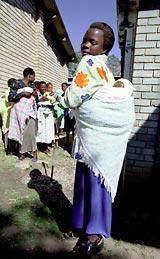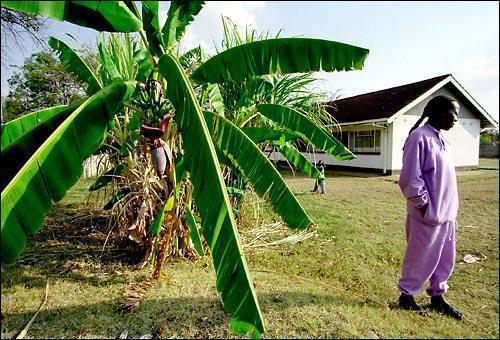 |
| BETTY UDESEN / THE SEATTLE TIMES |
| In sub-Saharan Africa, women average
six children, starting at about 19. Here, young mothers bring
their 6-week-old babies to a clinic in Chitungwiza
township for a check-up. |
|
 |
 |
TO BE A FULL WOMAN in Zimbabwe, you must have children. That's how you earn the title of respect: Amai, mother. Should you die without giving birth, a rat and corncob will be strapped to your back where you would have swaddled your baby so you won't go childless to your grave.
In this maternal milieu, most women have a child within a year or so of marrying. It's often through a sickly baby or prenatal testing that young women discover they are infected with HIV.
So it was with Petudzayi Nyanhandam. She was 22, swinging down the sidewalk in a smart navy blue suit with matching flats, when she met the love of her life. Maxmore was 28, handsome, kind, funny, an engineer rising through the executive ranks, pens peeking out of his shirt pocket.
In 1992, a year after they married, when their infant son, Tariro, was diagnosed with pneumonia and then AIDS, the couple learned they were both HIV-positive. The baby died after nine months without ever smiling or sitting up.
Pressure to have another child was enormous. In 1995, Petu got pregnant again.
"The desire of wanting to be a mother does not go away because you're HIV-positive," she says. "It's just natural, within us, you know, the mothering instinct, wanting to be called Mommy."
 |
 |
| BETTY UDESEN / THE SEATTLE TIMES |
| "Wanting to be a mother does not go away because you're HIV positive," says career
woman Petudzayi Nyanhandam. "It's just natural, within us, you know, the mothering
instinct, wanting to be called Mommy." She lost her husband and two infant sons to
AIDS, and is herself HIV-positive. But she considers herself "lucky" because she can
afford medicine and good nutrition. |
|
 |
Petu's second son, Takudzwa, also was 9 months old when he died of cerebral palsy and AIDS. Her husband died the following year.
Instead of wedding and vacation pictures in Petu's family photo albums, there are funerals and graveyards. Striped tents sheltering mourners from the sun. Her husband's handsome casket trimmed with three tiers of blond wood and silver filigree handles. Her babies wreathed in lace, their cheeks chubby, even in death.
Even so, Petu, 33, calls herself "one of the lucky widows." She's built a strong career maintaining computer networks for the nation's largest telecom company. She lives in an upscale neighborhood of jacaranda trees and servants. She can afford good nutrition, soap and medicine for her ulcers and thrush.
"The desire of wanting to be a mother does not go away because you’re HIV-positive."
— PETUDZAYI NYANHANDAM, CAREER WOMAN, AIDS PATIENT |

|
 |
 |
 |
 |
 |
Yet neither money nor education protects women from a disease that preys on their strongest desires: To love and be loved and have children.
Poverty simply makes the terrible worse. Petu scoffs at reports of the government talking with donors about pricey drug cocktails. The country has hardly any Nevirapine, an effective, inexpensive drug that helps prevent transmission of HIV from mother to child. "How are you going to provide antiretroviral drugs when you can't provide mealy-meal? Can you take the antiretrovirals on an empty stomach? We need milk, we need bread, we need washing soap for home-based care."